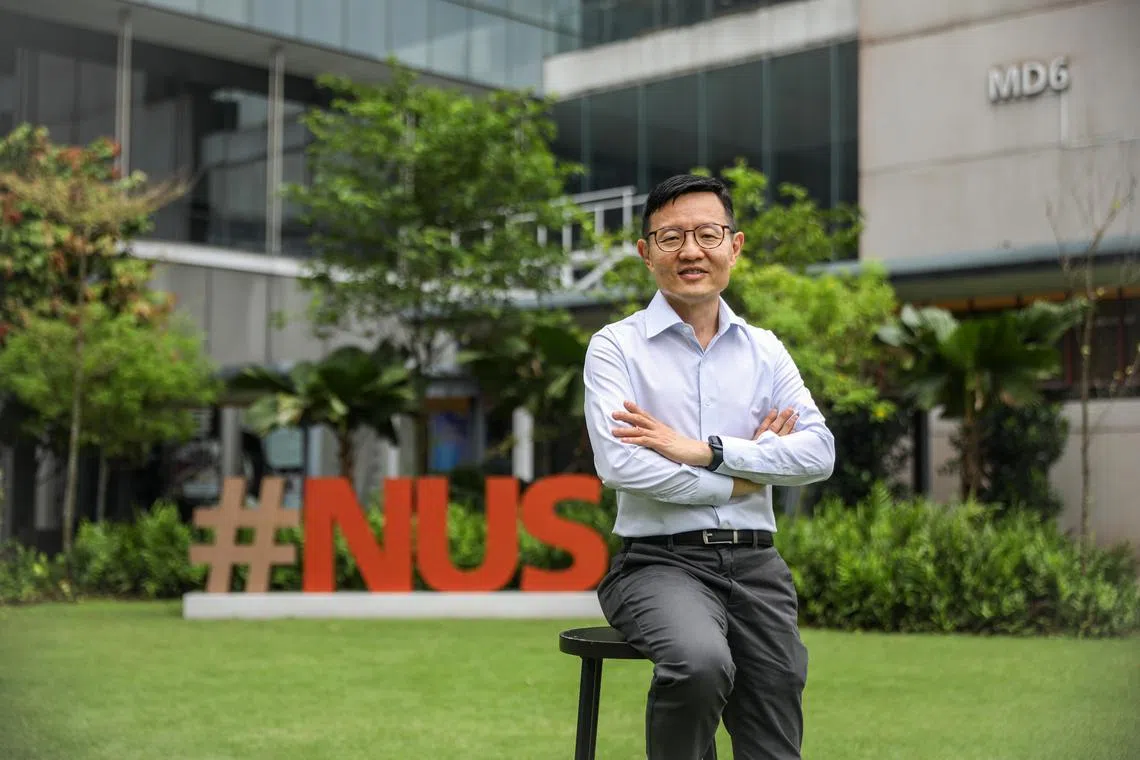NUS prof awarded prestigious fellowship in UK for his biomedical innovations and research
Sign up now: Get ST's newsletters delivered to your inbox

Among the 70 newly elected fellows of the Royal Society in 2024, Professor Lim Chwee Teck is the only scientist based in Singapore.
ST PHOTO: LUTHER LAU
SINGAPORE – Collecting samples from a tumour to diagnose cancer can be an extremely painful and invasive process for patients, often requiring a needle or surgery to collect tumour cells.
Now, just a simple blood test can help doctors detect cancer, using a device that can sieve out tumour cells from blood drawn from patients.
Developed in 2009 by Professor Lim Chwee Teck, director of the Institute for Health Innovation and Technology at the National University of Singapore (NUS), the biochip is the world’s first to filter tumour cells through micro-channels, allowing doctors to isolate selected tumour cells for analysis and accurately diagnose certain cancers such as breast and prostate cancers.
The cancer detection device was later commercialised into a machine launched by Biolidics, one of the deep-tech companies co-founded by Prof Lim.
Since its development, 140 systems have been installed in more than 20 countries, including the US, China, the United Kingdom, Germany and Singapore.
This is just one of the many projects that the serial inventor has helmed throughout his 24-year career at NUS.
In recognition of his contributions to the field of biomedical engineering, Prof Lim was in May elected as Fellow of the Royal Society, the UK’s national academy of sciences and the oldest scientific academy in continuous existence.
Past fellows include renowned scientists Isaac Newton, Charles Darwin, Albert Einstein, Winston Churchill and Stephen Hawking.
Among the 70 newly elected fellows of the Royal Society in 2024, Prof Lim is the only scientist based in Singapore.
Fellows are elected for life through a peer review process on the basis of excellence in science.
“I’m both proud and very humbled to be a Singaporean who’s elected as a Fellow (of the Royal Society),” Prof Lim said.
“It’s not only a recognition of the work that I’m doing in my lab, it also underscores Singapore’s growing influence and contribution to the global scientific landscape.”
His other accolades include the Nature Lifetime Achievement Award for Mentoring in Science in 2023 and the President’s Technology Award in 2011.
Other innovations pioneered by Prof Lim include a smart insole that helps diabetic patients to monitor pressure on different parts of the foot via an app to help manage ulcers on the bottom of their feet.
Excessive pressure can cause ulcers to get infected, which may lead to amputation. To prevent this, the app alerts patients to rest when the insole senses excessive pressure.
Despite co-founding six deep-tech companies since 2000, Prof Lim has given the majority of the shares to his students.
“To be fair, they are the ones running the company,” he said.
After starting a company, he usually gets involved for two to three years before passing the baton to his students, he added.
“I’m still very interested in doing research. I want to spend time in a university doing research, develop more technology and then spin up more companies.”
Prof Lim is also venturing into the metaverse.
With a team of researchers, he developed wireless gloves that can convey touch and grip when interacting with virtual objects in a virtual space.
Currently, the team is testing the use of the gloves for patients undergoing rehabilitation.
Patients can potentially undergo rehabilitation at home by wearing the gloves and a virtual reality headset, and do exercises such as picking up virtual blocks that they can feel and grab.
A hospital in Norway is also keen to collaborate with the team to use the gloves as a rehabilitation tool from home, said Prof Lim.


